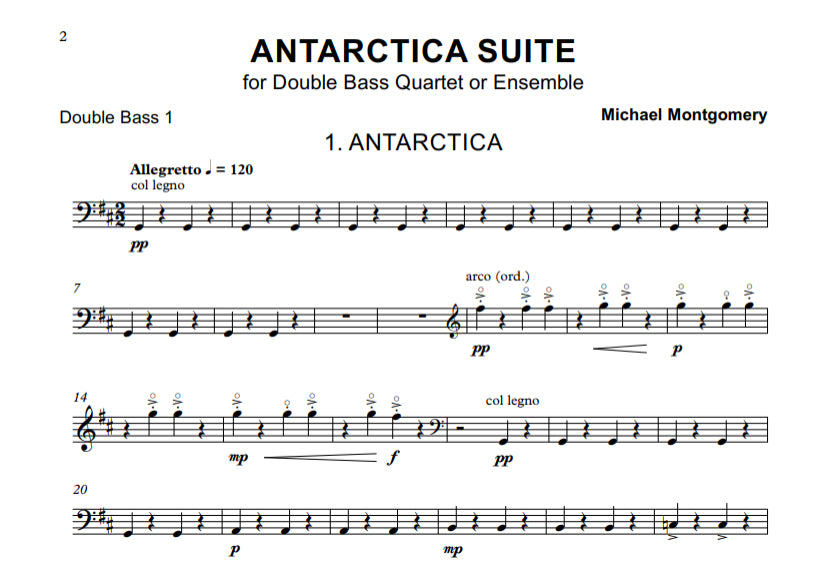David Heyes
Michael Montgomery: Antarctica Suite for double bass quartet
Michael Montgomery: Antarctica Suite for double bass quartet
Couldn't load pickup availability
About the Suite
Antarctica Suite is a five-movement work aimed at the young progressing bass quartet, also playable by larger forces. A wealth of colors, textures, and timbres are explored, offering effective musical and technical challenges for each bassist.
Each movement is a miniature tone poem, often incorporating simple harmonics alongside the orchestral range of the instrument. The pieces have a didactic aspect, as well as being wonderful concert literature, offering much to the enterprising and adventurous bass quartet or ensemble.
1. Antarctica - The Vast White Wilderness
Being a land known for its wide expanse and solitude, desolation and beauty, many of Antarctica’s faces are likely familiar to most who would consider her - several are here represented in this and the remaining four movements of the suite, which are intended to serve as musical snapshots of one of the most hostile and barren corners of our planet.
2. Totten - Mammoth River of Ice
In your mind’s eye picture the deep rushing torrents of the largest and fastest flowing river you can imagine, a tremendous aquatic highway draining the waters of an entire continent out into a faraway sea. If you can freeze (literally!) frame that image and give it the backdrop of an endless frozen wasteland, you will have conjured up for yourself the image of the great Totten Glacier of Antarctica, meandering and flowing ever so slowly (as glaciers are wont to do) from the center of the continent northeast toward Cape Waldron and the Austral Ocean.
3. The Penguin - Tuxedo-clad Harlequin
Sometimes awkward, ever playful, the penguin is one of the most recognized and well-liked creatures of the land, and spending an afternoon enjoying the antics of this happy fellow among his playmates is perhaps the favorite pastime of any tourist who makes the pilgrimage to this frozen continent.
4. Orcinus orca - The Killer Whale
During the many years, I lived on the edge of the Everglades near the Miccosukee Indian reservation, I was forever fascinated with the traditions and stories of these people. I can still remember the musings of Buffalo Tiger, a shaman to the tribe, as he reminisced about the old ways, saying there were those who “still remember the song and could ride the whale”. The whale he referred to, of course, is the Orca, a creature found in each of the world’s oceans as well as many legends of indigenous peoples worldwide. While the character of the opening punctuations here portrays the largest and most terrifying predator to prowl the Antarctic shoreline, the quality of the sweeter melody introduced midway through the movement depicts a sentient being who is also an integral member of a surprisingly social family group.
5. Secret Gardens - Lakes Beneath the Ice
As you delve into this movement, picture yourself somehow shrunk to microscopic size and transported to a massive dark pool in a hidden world beneath a blanket of ice half-mile deep.
Though isolated from the rest of the planet you find yourself in the midst of an abundant thriving community of microbes, hidden and lurking for millennia in lakes beneath the continent's cold glacial ice, celebrating with endless dance their ancient existence.
About the Composer
Double bassist Michael Montgomery, a student of Robert Rohe (Principal Bass,
New Orleans Symphony) and Lucas Drew (Principal Bass, Miami Philharmonic), earned his Doctor of Musical Arts degree in double bass performance from the University of Miami, played full-time in the bass section of the Florida Philharmonic Orchestra for two decades.
He now lives in the Ozark Mountains of Arkansas, where he teaches double bass at the University of Arkansas Fayetteville and privately in his home studio. Michael has composed numerous works for young double bassists (including over five dozen short bass quartets for young students) which are published by Recital Music and two American publishers.
His articles about bass performance, literature, and teaching have been published in American Suzuki Journal, Bass World, and Pastoral Music.












